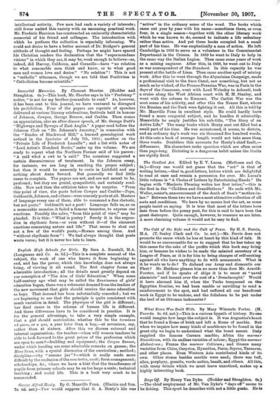"active" in the ordinary_ sense of the word. The books
which- came out year by year with his name—sometimes three, or even four, in a single season—together with the other literary work which he was known to do, seemed to indicate a life sedentary rather than active. And yet these books occupied but a small part of his time. He was emphatically a man of action. He left Cambridge in 1855 to serve as a volunteer in the Commissariat Department in the Crimea. In 1859 he went to Italy to help in_ the same way the Italian Legion. Then came some years of work as a mining engineer. After this, in 1866, he went out to Italy as war correspondent of the Standard. In this capacity he was present at the battle of Lissa. Then came another spell of mining work. After this he went through the Abyssinian Campaign, made a professional visit to the Suez Canal, saw something, but not as much as be wished, of the Franco-Prussian War, was in Paris in the- days of the Commune, went with Lord Wolseley to Ashanti, took a cruise along the West African coast with H. M. Stanley, and went with the column to Kumassi. The Carlist War was the- next scene of his activity, and after this the Nearer East, where the Russian and the Turk were fighting it out. All this is told by Mr. Manville Fenn in excellent style. He could hardly have found a more congenial subject, and he handles it admirably. Meanwhile he amply justifies his sub-title, "The Story of an Active Life." The many books which Henty sent out filled but a small part of his time. He was accustomed, it seems, to dictate, and an ordinary day's work was six thousand five hundred words.. At this rate a book of average length would not take more than- three weeks. Doubtless this accounts for Henty's chief fault,— diffuseness. His characters make speeches which are often more- than page-long. Dictating is a dangerous habit unless the limits are rigidly fixed.


















































 Previous page
Previous page